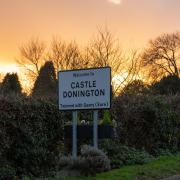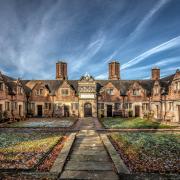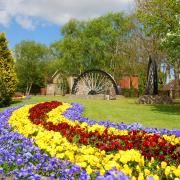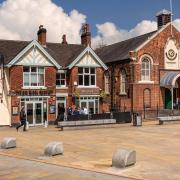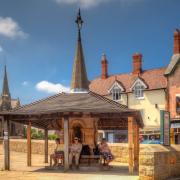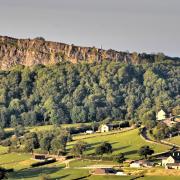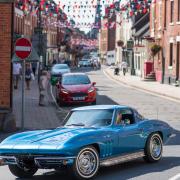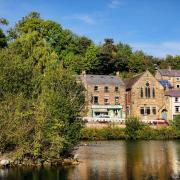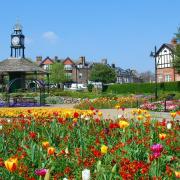Peter Seddon raises a timely glass to the family that founded the Bass & Co. Brewery

In the square adjacent Derby Central Library and the Museum and Art Gallery stands an impressive bronze statue of the brewing magnate Michael Thomas Bass (1799-1884) – grandson of William Bass who founded the Bass & Co. Brewery in 1777.
It was Derby’s first monument to a public figure and as such of historic significance. Created by eminent sculptor Sir Joseph Edgar Boehm (1834-1890) it is also of aesthetic value as a work of art in its own right.
It is appropriate that Mr Bass should reside in that location, for it was through his generous beneficence that the Derby Free Library and Museum came into being – funded at £25,000 from his own personal fortune.
Following its formal opening on 28th June 1879 – conducted by Bass himself – one of the speakers observed proudly: ‘There is the Free Library he has given you. An institution which will subsist in Derby, I hope, as long as books are written and as long as books are read.’

The ‘I hope’ qualification has ultimately proved prophetic. Generations of Derbeians of all types spanning three centuries have since benefited from Derby Central Library – but now after 139 years it is shortly to close. The building will remain in use for other purposes – but a much-diminished selection of the books will be relocated to a new ‘library space’ within the Council House.
The unbidden change might arguably render Michael Thomas Bass somewhat compromised – perhaps even slighted. For his likeness depicts the benefactor gazing steadfastly down at a scroll beneath his left hand – the plan and Deed of Gift of the Free Library he gave to Derby in apparent perpetuity.
That Bass remains ‘cast’ is certain – two tons of bronze show an imposing figure in his middle-aged prime. Likewise he continues to look ‘down’. Might the sum of those parts now render him ‘downcast’ – given the fate of his gift, who could blame him?
But that would be starkly out of character for a man widely admired and even revered by all classes of Victorian society. Countless contemporary reports depict a genial character full of energy with a genuine desire to bring about ‘social betterment’ – exactly the combination of caring qualities that ought to be as admired today as in his own time.

In addition through his phenomenally successful brewing empire Bass provided direct and indirect employment for countless thousands – and was observed to be ‘a model employer’ well-respected by workers and their families. In turn Bass amassed great personal wealth as a result of his astute and tireless effort in growing the business.
This enabled him to build a great mansion and acquire large tracts of land – but Bass remained firmly grounded, committing himself to good causes and using his drive, knowledge and influence to make positive inputs into the lives of those less well-placed than himself. This he did through cumulative donations amounting to many millions of pounds in today’s equivalent.
When asked to explain his philosophy Bass gave a ready reply: ‘I have made a lot of money; I have had much pleasure in making it – but I had much more pleasure in giving it away.’ This even-handed approach made him popular in politics ‘on both sides of the house’ – he was Liberal MP for Derby for 35 years. Indeed his critics in any sphere were few and far between.
And they were invariably errant voices. One embittered churl railed that ‘the apparently charitable gestures of Mr Bass are merely some feathers being given back by the man who has already taken the goose.’

Bass might have replied that in addition to charitable gifts he had also contributed enough of his own ‘feathers’ to the taxman to create countless flocks of geese – and that his company contributed £250,000 per annum to the national coffers in beer duty alone. But his dignity resisted the rise to such ill-cast bait.
The foremost beneficiaries of his voluntary donations were the town of his birth Burton upon Trent and his adopted town Derby – for which in his parallel political life he was the elected Liberal MP from 1848-1883. In that capacity he was said to have been much-liked by most of the ‘ordinary townsfolk’.
To Burton he gave the Town Hall, St Paul’s Church and other public buildings. In Derby in addition to the Library and Museum he gave the Art Gallery and significant support to both the School of Art and Derby Infirmary.
The list goes on. In 1867 he gave three acres of land for the Bass Recreation Ground which is still one of the city’s largest green spaces. Two open-air swimming baths were added to ‘Bass’s Rec’ in 1873 – when these finally closed during World War Two the Derby Telegraph mourned their passing: ‘Mr Bass’s baths gave incalculable pleasure to many thousands of all ages and contributed a great deal to the age-old tradition of strong local swimmers known hereabouts as ‘Derby Ducks’.’

Bass was also particularly known for his unfailing support of the town’s railway workers – his initiatives led to improved working conditions and the founding of Derby’s pioneering St Christopher’s Railway Orphanage. But these large projects were merely the tip – it was said that ‘for every publicised major cause Mr Bass fulfilled countless personal kindnesses seldom recorded.’
This widespread respect for Bass propelled the campaign to perpetuate his memory. He died aged 84 at his home Rangemore Hall near Burton on 29th April 1884 – one obituary called him ‘the best friend that Derby ever knew’. Soon thereafter it was approved that a public subscription would be raised for the erection of a statue. The required sum of £2,000 was swiftly gathered and one of Britain’s best sculptors commissioned – Joseph Boehm enjoyed the fulsome patronage of Queen Victoria and counted the Duke of Wellington and many eminent figures among his subjects. Derby did well to secure his services.
The statue was initially sited in the town’s central hub, the Market Place. The unveiling ceremony on 17th October 1885 attracted rather more than the few usual dignitaries – Market Place, Iron Gate and Corn Market were packed tight with local citizens keen to demonstrate their respect for a man they admired. That is something to be mindful of when considering the Bass statue in its modern context.
Mr Bass remained in the Market Place until 1926 when increasing traffic and attendant road improvements necessitated his removal. Amidst some controversy the statue was taken from its plinth and mounted indoors in the Strand entrance lobby of the Museum and Art Gallery. An outdoor piece in an indoor setting didn’t really work. But there it stayed – at least until the fateful day in August 1941 which almost spelled its end.

Responding to a call for scrap metal to aid the War Effort, the over-zealous curator of Derby Museum & Art Gallery shamefully sold Mr Bass, without consultation, to Derby scrap dealer E Barker & Co. for the miserly sum of £27 a ton. On 5th August 1941 workmen from Pickfords Ltd removed the statue to its intended final resting place.
Only when a passer-by saw the forlorn head of Mr Bass lurking over a fence did the alarm bells sound. The Town Council quickly denied any knowledge of the ‘unauthorised removal’ and after a Derby Telegraph campaign ‘the best friend Derby ever knew’ was reinstated to the Art Gallery.
Informed comment at the time remarked upon the close call and ‘how astonishing it is that a statue erected less than sixty years ago to a man of such great repute should have been so soon dismissed by those in authority.’
When a new extension to the Derby Library and Museum complex was opened in 1964 the Bass statue was relocated to Museum Square. Since then it has been moved again only a few yards to its current spot.
All indications are that sensible fair-minded opinion should ensure the long-term future of Mr Bass either in his current home or elsewhere in the city. But we live in irrational times in which the ‘statue police’ are increasingly seeking retrospective justice on grounds of inappropriate behaviour.
Consider the scene: ‘Call Michael Thomas Bass. You are hereby charged with being a wealthy landowner who made much of his fortune selling intoxicating liquor to the British Empire. You took pleasure in fox-hunting and salmon-fishing and enjoyed recreational billiards at a time the balls were made of ivory. For these acts you are guilty as charged – an irrelevance to Derby and with no rightful place in the modern world. Constable – melt him down!’
It is said that many a true word is uttered in jest. Mr Bass may well be downcast – but to see him ‘cast down’ would be beyond a joke. There is no suggestion that he is under any imminent threat, but lest he should ever need a helping hand the words of the Derby Telegraph at the time of his 1941 ‘kidnap’ ordeal will serve as good as any.
‘It may be all very well for the modern generation to belittle the achievements of Victorian celebrities, but there is a sufficiently keen appreciation of Mr Bass’s services to Derby to resent very strongly his removal from the scene. Derby’s illustrious member was not “of an age” but “of all time”. Let no one forget it!’






